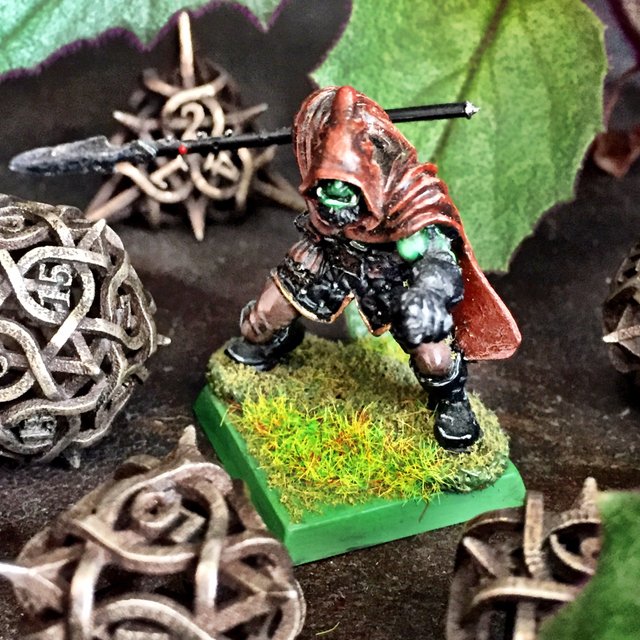Secrets and Motivations: Become a Better Game Master and Storyteller #2

Tabletop Roleplaying games, like Dungeons & Dragons, are an essential part of my life. They help me get in touch with the part of my mind that many people me seem to have given up on -- The Imagination.
For those of you who aren’t familiar with Tabletop roleplaying games, the concept is simple: Everyone sits around a table. They take on the persona of a character that (in most games) they created, those characters exist in a world called a campaign setting, then they use dice a tool for creating the randomness of the world.
What Is A Dungeon Master?
The Dungeon Master (or Game Master) is the person who runs the storyline for the adventures. As the DM (or GM) you create an interactive experience for everyone playing, developing problems to solve, giving the group monsters to fight, providing all of the other personalities in the game, from the shopkeep to the evil overlord, but most importantly — the Dungeon Master is the storyteller.
A dungeon master can never know everything that the players are going to do, but if you spend a few extra minutes preparing, using the following tips, you can put yourself in a position to have everything lead them down the path you’d like.
More tips and info on Dungeon Mastering here: Become A Better Game Master and Storyteller #1
Give Everyone And Every Place A Secret
Secrets will improve your game playing experience in at least two ways:
- Secrets will give non-player characters enough identity to roleplay effectively.
- Secrets are tools you can use to get the characters on track when they inevitably run screaming off track.
Here’s how it works:
Before you run your game, list all the major and minor characters that the players may run into. Write out one secret for each of them. Next, write out a few areas the players might visit. Write out one secret for each. Don’t spend too much time on these, chances are the players will never learn the secrets. If the players are off track and they discover any of the secrets use it to link back to the adventure.
Here are a few examples of simple secrets:
- The Baron’s daughter stole a knife from her mother.
- The priest killed someone and has never told anyone.
- The shopkeep has a magical creature locked up somewhere.
- The wizard’s son has been contacting planar creatures without anyone knowing.
- The blacksmith shop was built over an ancient grave.
- The a group of bandits buried their treasure in the forest.
- There’s a monk meditating in a cave in these mountains.
- The house has a treasure from its deceased owner hidden under the floor.
Give Everyone A Perspective
This is a screenwriting lesson from Joss Whedon that carries over to Tabletop roleplaying perfectly:
“Everybody has a perspective. Everybody in your scene, including the thug flanking your bad guy, has a reason. They have their own voice, their identity, their history. If anyone speaks in such a way that they’re just setting up the next person’s lines, then you don’t get dialogue: you get soundbites. Not everybody has to be funny; not everybody has to be cute; not everybody has to be delightful, and not everybody has to speak, but if you don’t know who everybody is and why they’re there, why they’re feeling what they’re feeling and why they’re doing what they’re doing, then you’re in trouble."
Giving characters motivation will increase the drama, give more depth to your world, and create new opportunities for both you and your players to interact.
For an RPG this may seem daunting, you may have cities, planets, or galaxies you’re dealing with how can you give everyone motivation?
Write a list of the non-player characters that the players will likely run into and write out one motivation for each. Then, think about the thugs, monsters, and minions connected to those non-player characters, and as a whole, give them a motivation. You’re not writing about each individual minion, rather you’re writing about a single motivation for each group.
Examples of motivations for masters and minions:
- The shopkeep always wanted to be an adventurer, but had to take over his family’s shop. His children are motivated by a sense of honor instilled by their hero loving father.
- The baron is motivated by power, he was the youngest of three deceased brothers and felt powerless his whole life. His minions are motivated by fear of their cruel master.
- The ranger is motivated by his pride, he’s become a legend in the nearby villages for his protection of the forests and it’s gone to his head. His scouts are motivated by a desire to be as famous as their captain.
Based on these motivations, can you think of a few ways that they might interact with the players?
- If the adventurers tell a good story maybe the shopkeeper gives them a discount.
- If they can prove that the minions and their families will be safe, maybe they’ll betray the baron.
- It’s likely that the ranger and his men will add a little flare and derring-do to their actions because they’re motivated by a desire to be famous.
By spending some time adding secrets and motivations you your world, you’ll not only have an easier time running the game, but also, your world will have so much more depth that your players will walk away with an incredible experience.
Thanks for Reading!
Check out my first set of dungeon mastering tips here:
Become A Better Game Master and Storyteller #1

What I find awesome is that these rules apply to any storytelling. As a fiction writer, it's always been far more beneficial to write characters that could pass as people rather than plot devices. Plot devices are flat and uninteresting, even if they're written in a spectacular way; in the end, they're predictable and detract from the story. But if they're written as people, with motivations, secrets, and aspirations of their own, they enrich stories.
I agree completely. I try to write the Game Mastering tips so that they carry over to writing as well. Thanks for reading.
Wooow. That brings up old memories from long time ago, in a galaxy far far away.
Great! Thanks for reading.
I second that...reading this took me back about 30-35 years...I still enjoy watching others play D & D.
I used to be crazy about D&D and Warhammer 40K back in the day. Haven't played either of them in years, but man what a blast from the past reading this post. Kind of makes me wish I had time to get back into it.
It's worth it! Find a local group or put one together. Thanks for reading!